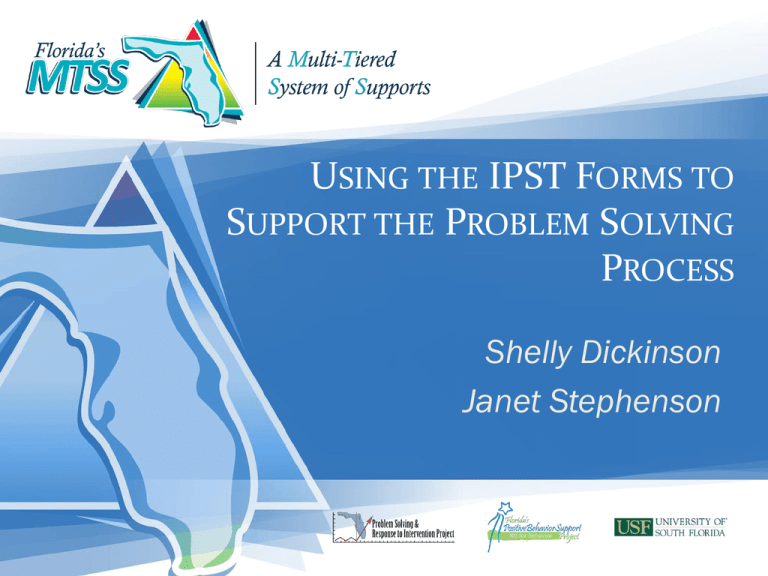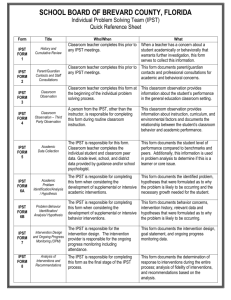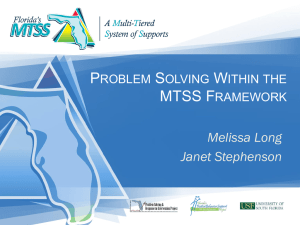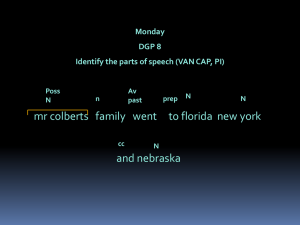Problem Analysis - Brevard County Schools
advertisement

USING THE IPST FORMS TO SUPPORT THE PROBLEM SOLVING PROCESS Shelly Dickinson Janet Stephenson Goals of Presentation 1. Provide an overview of the Individual Problem Solving Team (IPST) Forms 1 – 8 2. Understand the problem solving embedded in the IPST Forms WHAT IS MTSS? WHAT HAPPENED TO RTI? Big Picture + _______________________________________________________________________ = Why MTSS? • Gen Ed vs. Special Ed; “Academic” vs. “Behavior” • Multiple initiatives with no integration • Duplication of effort and resources Need to Integrate Services and Policies Brevard’s Individual Problem Solving Teams (IPST) Mission & Leadership Curriculum General Ed ESE Student Svcs Problem Solving through the IPST Forms Define the Problem What Do We Want Students to KNOW and Be Able to DO? Forms 1 - 6 Evaluate Did It WORK? (Response to Intervention – RtI) Form 8 Problem Analysis Why Can’t They DO It? Implement Plan What Are WE Going To DO About It? Form 7 Use repeatedly until you finds what works! New Way of Thinking From: “What’s wrong with this child?” To: “What supports does this child need to be successful?” Instruction Curriculum Environment Learner Getting to Know the IPST Forms Preface Quick Reference Sheet Directions IPST Forms 1 – 8 Glossary BREVARD PUBLIC SCHOOLS, FLORIDA Individual Problem Solving Team (IPST) IPST FORM 1 History and Cumulative Review Problem Analysis Why is the Problem Occurring? First step in Problem Solving is to gather and review information about the “L” in ICEL. If the teacher has a concern about the “Learner”, historical information must be documented. BREVARD PUBLIC SCHOOLS, FLORIDA Individual Problem Solving Team (IPST) IPST FORM 2 Parent/Guardian Contact and Staff Consultations Problem Analysis Why is the Problem Occurring? Parents play an integral part in informing and helping school personnel know how to support the student more effectively. Seeking staff consultations helps the classroom teacher address the student’s area of difficulty. BREVARD PUBLIC SCHOOLS, FLORIDA Individual Problem Solving Team (IPST) IPST FORM 3 Student’s teacher as observer Classroom Observation Problem Analysis Why is the Problem Occurring? Gathering additional information in the general classroom setting addressing ICEL which focuses on the Instruction, Curriculum, Environment, and the Learner. This information helps the team to determine what factors enable the student to learn. BREVARD PUBLIC SCHOOLS, FLORIDA Individual Problem Solving Team (IPST) IPST FORM 4 Third Party Observation Classroom Observation Problem Analysis Why is the Problem Occurring? Successful problem analysis requires the team to look at multiple sources of data. ICEL factors are documented as well as the relationship between the student’s classroom behavior and academic performance. BREVARD PUBLIC SCHOOLS, FLORIDA Individual Problem Solving Team (IPST) IPST FORM 5 Academic Data Collection Problem Analysis and Identification Why is the Problem Occurring? Reviewing student performance data and comparing to peer groups will determine the magnitude of the academic concern. This specific data assists the team to identify or eliminate concerns in Instruction and Curriculum (ICEL). Problem ID Review Benchmark Peer Comparisons Depicts an individual student problem. The peer group is performing at or above benchmark, while the target student is well below. Target student and the peer group are well below benchmark. Therefore, it would be necessary to approach the problem at a Tier 1 or class-wide level. BREVARD PUBLIC SCHOOLS, FLORIDA Individual Problem Solving Team (IPST) IPST FORM 6 ACADEMIC Academic Problem Identification / Analysis / Hypothesis Problem Identification/Analysis Why is the Problem Occurring? The intent of the ICEL table on this form is to review of all the ICEL factors. It’s almost a check and balance system to ensure the focus is on the ICEL factors and not just the learner. Keep in mind, when creating a hypothesis, it is important to determine if it is a skill deficit or motivation deficit? Determining the point at which the target student will come in range of the expected rate of progress. BREVARD PUBLIC SCHOOLS, FLORIDA Individual Problem Solving Team (IPST) IPST FORM 6 BEHAVIOR Problem Behavior Identification / Analysis / Hypothesis Problem Identification/Analysis Why is the Problem Occurring? Same format at IPST Form 6 Academics but focuses on the Behavior component. The intent of this form is to guide the IPST to design effective interventions. BREVARD PUBLIC SCHOOLS, FLORIDA Individual Problem Solving Team (IPST) IPST FORM 7 Intervention Design and Ongoing Progress Monitoring (OPM) Intervention #: ______ Page ____ of ____ Implementation Plan What are We Going to do About It? Spending time designing a quality intervention plan will be most beneficial to the student. The alignment between the area of concern to the goal statement, intervention plan and ongoing progress monitoring tool is crucial. BREVARD PUBLIC SCHOOLS, FLORIDA IPST FORM 8 Individual Problem Solving Team (IPST) Analysis of Interventions and Recommendations EVALUATE Did it WORK? The IPST will utilize the rate of progress data and post intervention analysis to make informed decisions regarding the educational needs of the student. Part I G General Education Intervention and Referral Part I G General Education Intervention and Referral Part I G General Education Intervention and Referral Part I G General Education Intervention and Referral










